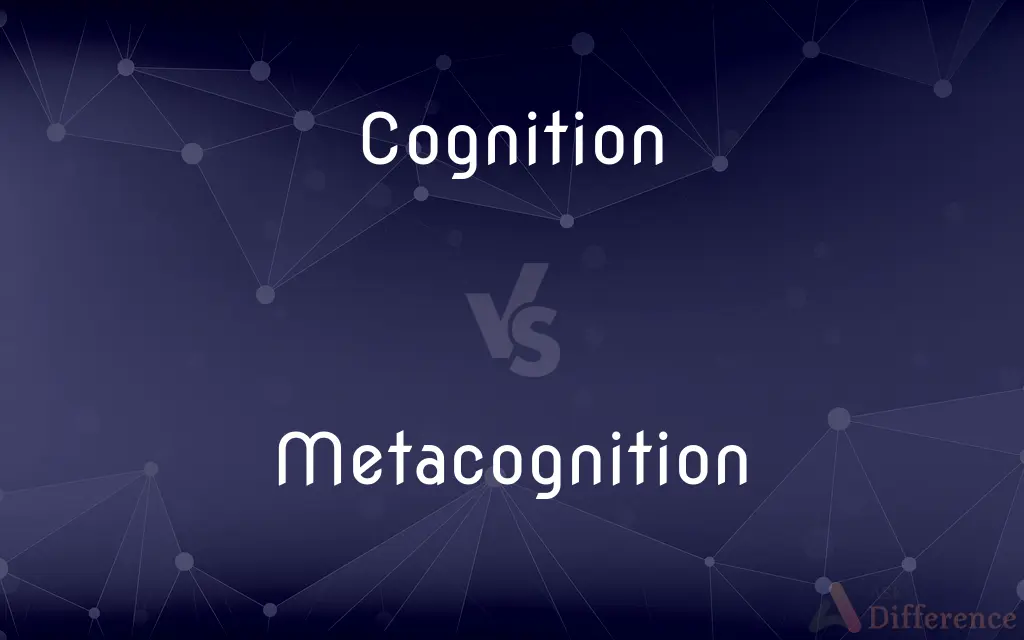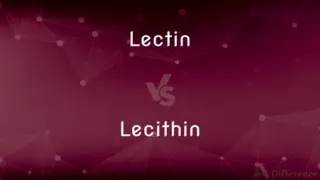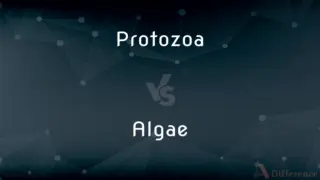Cognition vs. Metacognition — What's the Difference?
By Tayyaba Rehman & Urooj Arif — Updated on March 13, 2024
Cognition involves mental processes like thinking and learning, while metacognition is the awareness of and reflection on these processes.

Difference Between Cognition and Metacognition
Table of Contents
ADVERTISEMENT
Key Differences
Cognition encompasses the mental activities associated with thinking, understanding, learning, and remembering. It's the process through which we acquire and process information, make decisions, and solve problems. Metacognition, on the other hand, refers to one's awareness and understanding of their own cognitive processes. It involves thinking about thinking, enabling individuals to analyze how they learn, solve problems, and make decisions.
While cognition includes all aspects of intellectual functions and processes, metacognition is specifically concerned with the self-awareness of those processes. For example, when learning a new skill, cognition involves understanding and applying new information, whereas metacognition involves evaluating how effectively one is learning and adapting strategies accordingly.
Metacognition allows individuals to monitor and control their cognitive processes. This includes planning how to approach a learning task, monitoring comprehension and progress, and evaluating the success of learning strategies. Cognition, however, is the execution of these tasks without the added layer of reflection and self-regulation.
The development of metacognitive skills can significantly enhance learning and problem-solving abilities. It enables learners to become more efficient by selecting and utilizing strategies that improve comprehension and retention. In contrast, cognitive development focuses on increasing knowledge and intellectual skills without necessarily improving self-awareness or self-regulation of these processes.
Metacognition plays a crucial role in educational contexts by teaching students to think about their own thinking. This helps them to identify their strengths and weaknesses, set learning goals, and adopt effective strategies. Cognition, being the underlying process of learning, benefits from metacognitive strategies, making learning more effective and personalized.
ADVERTISEMENT
Comparison Chart
Definition
Mental processes like thinking and learning
Awareness and reflection on one’s cognitive processes
Focus
Acquisition and processing of information
Self-awareness of how one acquires and processes information
Examples
Problem-solving, decision-making, memory
Planning how to learn, monitoring understanding, evaluating strategies
Role in Learning
Fundamental to understanding and knowledge
Enhances learning through self-regulation and strategy adjustment
Application
Executing tasks, interpreting information
Improving and adapting learning strategies, self-assessment
Compare with Definitions
Cognition
Information Processing.
Cognition involves processing information from the environment.
Metacognition
Strategy Evaluation.
Through metacognition, learners evaluate the effectiveness of their study strategies.
Cognition
Problem-Solving.
Problem-solving requires cognitive processes to analyze and resolve issues.
Metacognition
Self-Awareness.
Metacognition involves being aware of one’s own learning process.
Cognition
Learning.
Through cognition, individuals learn new concepts and skills.
Metacognition
Reflective Thinking.
Metacognition enables individuals to reflect on their thought processes and outcomes.
Cognition
Memory.
Memory functions are a core aspect of cognition, enabling recall and knowledge application.
Metacognition
Learning Adaptation.
Metacognition allows for the adaptation of learning strategies based on performance feedback.
Cognition
Decision-Making.
Cognition is critical in evaluating options and making decisions.
Metacognition
Self-Regulation.
Effective learners use metacognition to regulate their approach to learning tasks.
Cognition
Cognition ( (listen)) refers to "the mental action or process of acquiring knowledge and understanding through thought, experience, and the senses". It encompasses many aspects of intellectual functions and processes such as: perception, attention, the formation of knowledge, memory and working memory, judgment and evaluation, reasoning and "computation", problem solving and decision making, comprehension and production of language.
Metacognition
Metacognition is an awareness of one's own thought processes and an understanding of the patterns behind them. The term comes from the root word meta, meaning "beyond", or "on top of".
Cognition
The mental action or process of acquiring knowledge and understanding through thought, experience, and the senses.
Metacognition
(philosophy) the act of thinking about thinking; sentience
Cognition
The mental process of knowing, including aspects such as awareness, perception, reasoning, and judgment.
Cognition
That which comes to be known, as through perception, reasoning, or intuition; knowledge.
Cognition
The process of knowing, of acquiring knowledge and understanding through thought and through the senses.
Cognition
(countable) A result of a cognitive process.
Cognition
The act of knowing; knowledge; perception.
I will not be myself nor have cognationOf what I feel: I am all patience.
Cognition
That which is known.
Cognition
The psychological result of perception and learning and reasoning
Common Curiosities
What is cognition?
Cognition encompasses the mental activities involved in acquiring, processing, and utilizing knowledge, such as learning, memory, and problem-solving.
Can metacognition improve learning?
Yes, metacognition can significantly improve learning by enabling individuals to assess their understanding and adapt their learning strategies for better outcomes.
How do cognition and metacognition differ?
Cognition is the process of thinking and understanding, while metacognition is thinking about one's own thinking processes and being aware of and controlling them.
How can one develop metacognitive skills?
Developing metacognitive skills involves practicing self-reflection on learning processes, seeking feedback, and adjusting strategies based on self-assessment and outcomes.
How is metacognition measured?
Metacognition can be measured through self-report questionnaires, reflective writing assignments, and observations of learning strategies and adjustments.
What challenges can arise in developing metacognitive skills?
Challenges can include difficulty in accurately self-assessing, resistance to changing ineffective strategies, and the complexity of accurately monitoring one’s own cognitive processes.
Why is cognition important?
Cognition is crucial for all aspects of learning, decision-making, problem-solving, and interacting with the world, forming the basis of human intellectual activity.
How do teachers facilitate metacognitive development in students?
Teachers can facilitate metacognitive development by encouraging reflection, teaching learning strategies explicitly, and prompting students to consider their thought processes.
What role does metacognition play in problem-solving?
In problem-solving, metacognition allows individuals to plan their approach, monitor their progress, and adjust their strategies as needed for better outcomes.
What is metacognition?
Metacognition refers to the awareness and control over one's own cognitive processes, including the ability to evaluate and adjust learning strategies.
Is metacognition a natural skill?
While some aspects of metacognition may come naturally, it is largely a skill that can be developed and improved with practice and guidance.
Can improving metacognitive skills impact academic performance?
Yes, improving metacognitive skills can have a positive impact on academic performance by enabling more effective learning and problem-solving strategies.
Are there any tools or strategies to enhance metacognition?
Tools and strategies to enhance metacognition include reflective journaling, self-questioning techniques, and the use of checklists or rubrics for self-assessment.
How does metacognition contribute to lifelong learning?
Metacognition contributes to lifelong learning by enabling individuals to continuously evaluate and adapt their learning strategies, making them more effective learners over time.
How does metacognition relate to self-regulated learning?
Metacognition is a key component of self-regulated learning, as it involves monitoring one’s own learning process and making adjustments to strategies based on this self-awareness.
Share Your Discovery

Previous Comparison
Lectin vs. Lecithin
Next Comparison
Protozoa vs. AlgaeAuthor Spotlight
Written by
Tayyaba RehmanTayyaba Rehman is a distinguished writer, currently serving as a primary contributor to askdifference.com. As a researcher in semantics and etymology, Tayyaba's passion for the complexity of languages and their distinctions has found a perfect home on the platform. Tayyaba delves into the intricacies of language, distinguishing between commonly confused words and phrases, thereby providing clarity for readers worldwide.
Co-written by
Urooj ArifUrooj is a skilled content writer at Ask Difference, known for her exceptional ability to simplify complex topics into engaging and informative content. With a passion for research and a flair for clear, concise writing, she consistently delivers articles that resonate with our diverse audience.













































